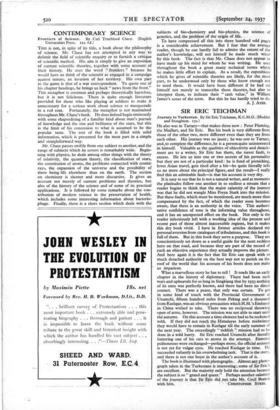SIR ERIC TEICHMAN
HE also was in Tartary—that makes three now : Peter Fleming, the Maillart, and Sir Eric. But his book is very different from those of the other two, more different even than they are from each other. His journey was no jaunt; he was sent to Tartary, and, to complete the difference, he is a person quite uninterested in himself. Valuable as the qualities of objectivity and detach- ment are to a writer, Sir Eric has them, the rarest fault, to excess. He lets us into one or two secrets of his personality but they are not of a particular kind : he is fond of picnicking, loves Asian travel, gets tired after a bit—he quite literally tells us no more about the principal figure, and the result—I really find this an admirable fault—is that his account is very dry.
It is easy to see that he is not a natural writer, and at moments the platitudes follow one another in so endless a stream that a reader begins to think that the major calamity of the journey was that he did not wangle Miss Freya Stark into the mission. But these faults, which must be mentioned, are much more than compensated by the fact, of which the reader soon becomes aware, that there is an authority in the voice. This authori- tative confidence of tone is the informing value throughout, and it has an unexpected effect on the book. Not only is the reader infectiously left with a working idea of the present and recent past of those almost inaccessible regions, but it makes this dry book vivid. I have in former articles declared my personal aversion from catalogues of tribulations, and this book is full of them. But in this book they serve a purpose. They are conscientiously set down as a useful guide for the next reckless hero on that road, and because they are part of the record of such an objective experience they actually improve the picture. And here again it is the fact that Sir Eric can speak with so much detached authority on the best way not to perish on the roof of the world that his account of his boots does not make us impatient.
What a marvellous story he has to tell ! It reads like an early chapter in the history of diplomacy. There had been such wars and upheavals for so long in Singkiang that by 1935 nothing of its state was perfectly known, and there had been no direct contact. There was a peace, that only was certain. To get in some kind of touch with the Provincial Government at Urumchi, fifteen hundred miles from Peking and a thousand from Kashgar, was an obvious precaution which H.M.'s Embassy in China wished to take. There was no reciprocal throwing open of arms, however. The mission was not able to start until the autumn. On this account a time element had to be reckoned with. If they did not reach the Himalayas before midwinter they would have to remain in Kashgar till the early summer of the next year. The exceedingly " ticklish " mission had to be done in a wild hurry. Sir Eric reached Urumchi after literally battering one of his cars to atoms in the attempt. Extreme politenesses were exchanged—perhaps more, the official account is not yet for vulgar eyes. He reached Kashgar in time. He succeeded valiantly in his overwhelming task: That is the story, and there is not one boast in the author's account of it.
The book is illustrated with photographs. Almost any photo- graph taken in the Turkestans is interesting; some of Sir Eric's are excellent. But the majority only hold the attention because the subject is so " grand and queer." Perhaps another calamity of the journey is that Sir Eric did not take Mr. Cecil Beaton


















































 Previous page
Previous page